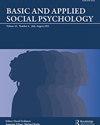道德信息:在大流行期间测试框架技术
IF 1.8
3区 心理学
Q2 PSYCHOLOGY, SOCIAL
引用次数: 1
摘要
摘要我们通过实验研究了对道德原则的呼吁——正如道德即合作理论所体现的那样——是否会增加与疫情相关的公共卫生行为。参与者(来自美国和印度)收到了有说服力的信息,被问及他们遵守与流行病相关的限制措施的意图,被要求向抗击新冠肺炎的慈善机构捐款,并完成了道德即合作问卷。我们发现,在增加亲社会意愿和捐赠方面,道德信息比非道德信息更有效,尤其是吸引英雄主义的信息。在美国样本中,当道德信息与参与者的道德价值观一致时,其影响更大。我们还发现,一些道德信息只对特定人群有效。本文概述了在循证交流中使用道德作为合作的下一步必要步骤。本文章由计算机程序翻译,如有差异,请以英文原文为准。
Moral Messaging: Testing a Framing Technique during a Pandemic
Abstract We experimentally investigated whether appeals to moral principles—as operationalized by the theory of Morality-as-Cooperation—increase pandemic-related public health behavior. Participants (from the USA and India) were presented with persuasive messages, asked about their intentions to follow pandemic-related restrictions, were asked to donate to a charity fighting COVID-19, and completed the Morality-as-Cooperation Questionnaire. We found that moral messages were more effective than non-moral messages in increasing Prosocial Intentions and Donations, especially messages appealing to Heroism. In the US sample, the effect of moral messages was larger when they were concordant with participants’ moral values. We also found that some moral messages were effective only in a particular population. This paper outlines the necessary next steps for using Morality-as-Cooperation for evidence-based communication.
求助全文
通过发布文献求助,成功后即可免费获取论文全文。
去求助
来源期刊

Basic and Applied Social Psychology
PSYCHOLOGY, SOCIAL-
CiteScore
4.50
自引率
12.50%
发文量
7
期刊介绍:
Basic and Applied Social Psychology (BASP) emphasizes the publication of outstanding research articles, but also considers literature reviews, criticism, and methodological or theoretical statements spanning the entire range of social psychological issues. The journal will publish basic work in areas of social psychology that can be applied to societal problems, as well as direct application of social psychology to such problems. The journal provides a venue for a broad range of specialty areas, including research on legal and political issues, environmental influences on behavior, organizations, aging, medical and health-related outcomes, sexuality, education and learning, the effects of mass media, gender issues, and population problems.
 求助内容:
求助内容: 应助结果提醒方式:
应助结果提醒方式:


